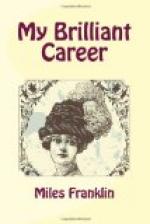We shore ourselves of all but the bare necessaries of life, but even they for a family of ten are considerable, and it was a mighty tussle to get both ends within cover of meeting. We felt the full force of the heavy hand of poverty—the most stinging kind of poverty too, that which still holds up its head and keeps an outside appearance. Far more grinding is this than the poverty inherited from generations which is not ashamed of itself, and has not as an accompaniment the wounded pride and humiliation which attacked us.
Some there are who argue that poverty does not mean unhappiness. Let those try what it is to be destitute of even one companionable friend, what it means to be forced to exist in an alien sphere of society, what it is like to be unable to afford a stamp to write to a friend; let them long as passionately as I have longed for reading and music, and be unable to procure it because of poverty; let poverty force them into doing work against which every fibre of their being revolts, as it has forced me, and then see if their lives will be happy.
My school life had been dull and uneventful. The one incident of any note had been the day that the teacher, better known as old Harris, “stood up” to the inspector. The latter was a precise, collar-and-cuffs sort of little man. He gave one the impression of having all his ideas on the subjects he thought worthy of attention carefully culled and packed in his brain-pan, and neatly labelled, so that he might without fluster pounce upon any of them at a moment’s warning. He was gentlemanly and respectable, and discharged his duties punctiliously in a manner reflecting credit on himself and his position, but, comparing the mind of a philanthropist to the Murrumbidgee in breadth, his, in comparison, might be likened to the flow of a bucket of water in a dray-rut.
On the day in question—a precious hot one it was—he had finished examining us in most subjects, and was looking at our copy-books. He looked up from them, ahemed! and fastidiously straightened his waistcoat.
“Mr Harris!
“Yes, sir.”
“Comparisons are odious, but, unfortunately, I am forced to draw one now.”
“Yes, sir.”
“This writing is much inferior to that of town scholars. It is very shaky and irregular. Also, I notice that the children seem stupid and dull. I don’t like putting it so plainly, but, in fact, ah, they seem to be possessed with the proverbial stupidity of country people. How do you account for this?”
Poor old Harris! In spite of his drunken habits and inability to properly discharge his duties, he had a warm heart and much fellowshiply humanity in him. He understood and loved his pupils, and would not have aspersions cast upon them. Besides, the nip he had taken to brace himself to meet the inspector had been two or three, and they robbed him of the discretion which otherwise might have kept him silent.




